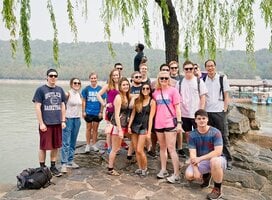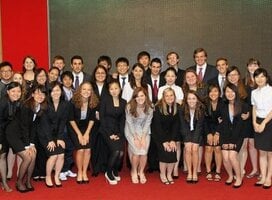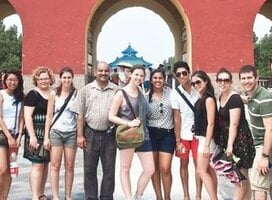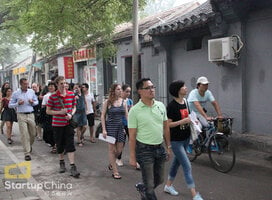Internships in Beijing, China
China’s capital, Beijing literally means the "Northern Capital". The second largest city in China, after Shanghai, Beijing is one of the major players in China’s economy and business relations. Not only is Beijing commonly chosen as a central location for China's biggest names, but it is also the preferred city of foreign companies; from start-ups to multinationals. Beijing is definitely a prime location to choose for interning abroad. You will get to know another country, discover a whole different world and culture, meet people from all around the globe, and build a strong network. Moreover, you will get to know yourself, and improve your resumé with strong international professional experience.
When seeking an internship in China, it's important to make certain that your employer and/or provider is submitting you for the correct visa and work permit. Foreign interns in China need to have a "special business F visa" that specifically prohibits compensation. Be wary of any provider promising paid internships in China. For more information, take a look at R&P Lawyers and China Briefing.
While business and international relations are the most popular fields for internships in Beijing, it is possible to find an internship in almost every field. You will most likely want to return to Beijing once you've completed your internship!
Accounting Internship: Interns work as accounting clerks, and as income and expense analysts by controlling Chinese invoices, assisting the Accounting department, book-keeping with the help of software, and analyzing sales trends.
Architecture & Design Internship: Options in the design field are unlimited, you have the opportunity to work as an architect, interior designer, design assistant, 2D or 3D game designer, website or mobile applications developer, sound designer, and graphic or web designer.
Marketing and Advertising Internship: Internship options include event planning, communication management assistant, content editing, customer relations, sales manager assistant, market and consumer research, and project management.
Public Relations Internship: Interns prepare PR plans and presentations for clients, proofread, blog, and provide support in online forums, edit administrative work, complete translation work, and take part in various online marketing tasks.
And the list could go on! In Beijing, there has to be something in it for everyone, so if your field isn’t listed, don’t despair! To begin your internship hunting, go on search engines or on internship placement agencies websites, such as the Hutong School.
When and Where to Look for an Internship
Finding an internship in Beijing is possible at any time of the year, and for any duration, although companies usually prefer a minimum of 1 month. Using an internship placement program to find an internship makes things easier, as you will be provided with support throughout the application process.
The length of your stay is up to you, but be sure to consider that you will need time to get settled, get to know the city, and learn how to get around. It is generally a good idea to begin searching for an internship position at least 3 months in advance, in order to have the time to apply for a visa, book flights, learn more about your future company, and arrange housing.
Visas for Interning in Beijing
Although the F Visa is the best for interning in China, the Tourist Visa (or L Visa) could be an alternative for 1 month or less internship (which is the maximum length of stay for the L Visa). The maximum length of stay varies from 30 days to 6 months.
When applying for a visa, you will be asked to choose between a single, double or multiple entry visa. Single entry doesn’t allow the traveler to go out the country and come back, double entry allows two entries in the country, and the multiple entry visa allows unlimited travels. The price increases according to the number of entries.
To enter China, the visa procedure must be done before departing, no visas are delivered at the airport or the border. To get a visa, it is possible to either ask a traveling agency to take care of the procedures, or to go directly to the Chinese embassy. Be aware that when applying for a Chinese Visa, you might not get the visa you're asking for.
Overstaying in China without a valid visa is prohibited by Chinese law, and could lead to an expensive penalty, and even a stay in jail.
In order to get a F Visa, the following documents are required:
- Original Passport – 6 months validity for the single entry visa; 12 months validity for the double entry visa. The passport must have at least two blank pages remaining.
- Visa Application form
- Passport size color photo – 33mm x 48 mm
- Invitation Letter from an authorized organization in China (your employer)
- While not always necessary, it is advisable to be ready to provide an airline ticket and a proof of housing in China
Normally, companies that frequently take interns are aware of visa procedures; Request a full list of visa requirements from the company you will be interning for, or your university. You can also find more information on China visas at VISA HQ.
As a foreigner traveling in China, it is mandatory to register at the local police station within the first 24 hours. It is also strongly recommended to always carry your registration proof, and your address of stay written in Chinese.
Cost of Living in Beijing
China’s currency is the Renminbi Yuan (RMB) which means People’s currency. In northern China, and especially in Beijing, it is also known as kuai. According to numbeo.com, the cost of living in Beijing is about half of the cost of living in an average American city. It is a fact that the average cost of living is lower than in the US and UK, but only if you live as a local. Start living as most expats, and you’ll see your monthly budget rise drastically! The amount you decide to put on groceries and restaurants, or on entertainment and short trips is up to you. If you live on a shoestring or share a small apartment, limit your expenses, and get around by bike, you can get by with 6000 RMB per month. To live more comfortably in a studio or in a big shared apartment, and to not have to watch your expenses, consider spending between 9,000 to 14,000 RMB per month.
Examples of costs in Beijing:
- Bus ticket: 1 RMB
- Subway ticket: 2 RMB
- Can of soda: 3 RMB
- Taxi: 10 RMB (for the first 3 km. 2 RMB for every additional km)
- Local draft beer (0,5L): 15 RMB
- Dinner at a Chinese restaurant: 20 RMB
- Fast food meal: 16 - 20 RMB
- One-way Airport Express ticket: 25 RMB
- New bicycle: 300 - 500 RMB
Work Culture in Beijing
In Beijing, like in most metropolitan cities in China, employers are used to hiring foreigners, therefore they are also familiar with the work culture of other countries. It wouldn’t be surprising if your company allows you to work according to the standards of your country, even though Chinese citizens usually work from 8 to 5, Monday through Friday, plus extra hours regularly.
It is also common to eat outside, just feel the pulse when your job will start. Bringing your own lunch or not is up to you, but know that generally employees of the same company have a pretty close relationship and frequently go to a restaurant together or to take out food during lunch time.
In business fields, English is most commonly used, although Mandarin is the official language in Beijing. You will be required to be at least fluent in English and/or Mandarin in order to work in Beijing.
To be successful, have cultural sensitivity, a sense of humor, patience, and a strong work ethic!
Networking: If you use an internship placement program, besides providing support and giving useful advice, you will also have the opportunity to meet other young professionals interning or working in Beijing. Furthermore, there are dedicated websites, focused on professional and social networking, and events promotion.
Check out these links to find out more about professional and social events happening in Beijing:
Work and Labor Laws in Beijing
According to Chinese laws and regulations, it is illegal for interns with an F business Visa to get paid. Be aware that to be legally eligible to get paid for working in China, one needs a Z employment Visa, which is much more difficult to get, and the applicant must meet rigorous prerequisites.
Things to Remember
- You will notice soon enough that taking a taxi is a very common thing in Beijing. However, there are legal and illegal taxis in Beijing. Usually the « fake taxis » are recognizable by their black color and the red light on their dashboard. Take the legal taxis to be sure to pay the real and fair price.
- If you take medication, be sure to bring enough for the duration of your stay as a visit to the doctor can quickly become very expensive.
- During the summer, expect very high and hot temperatures (sometimes too hot!) and chilly to freezing cold days in the winter, partly because of winds coming from Siberia. There are also frequent sandstorms in the spring.
- Upon arrival to your new address in Beijing, take a walk around in order to locate important spots nearby including the grocery store, pharmacy, bank, bus stops, and the police station.
- Don’t forget to get registered at the police station when you arrive in Beijing!
- Always carry your address with you, written in Chinese.
- Get yourself a Beijing (or China) travel guide before arriving in Beijing. This way you will already know some things about the city, and will be able to plan out what you want to visit in the first few weeks.
- In China, when talking to someone, remember that the surname comes before the first name. For instance, a woman named Zhao Anmei, should be called Mrs. Zhao.
- Always verify the money you get back from shops and taxi drivers – there’s a lot of counterfeit money in China, and malicious people could try to pass it to you. To identify « fake money », a lot of different tests can be done, but the easiest one is to touch the lower left corner of the front side of any bank bill to feel the braille dots. If there aren't any raised dots, then the bill is fake.
- Stay informed of what’s happening in China by reading English publications such as China Daily and The World of Chinese.
- Stay far away from any political or religious conversations with locals.
- Among other northern China specialties, the Peking duck (Běijīng kǎoyā), hot pot (huŏguō), assorted street-kebabs (Chuàn), dumplings (Jiǎozi) and stuffed steamed buns (Bāozi) are a must to try!
- Get yourself a cellphone and a SIM card as soon as you arrived in Beijing. You can go to stores like China Mobile or China Unicom. You can buy a cheap phone with a card for 200-300 RMB.
- Keep smiling and be friendly, even if they look at you strangely sometimes. They are probably just curious to see a foreigner! When you know some words, try to practice with people on the bus or in the subway. Most likely, they will be happy to see you trying to speak Mandarin!
Contributed by Laura Lee Moreau
Internship Programs in Beijing
Pagination
What People Are Saying
New Internship Placements
View the latest intern placement postings on our job board.














